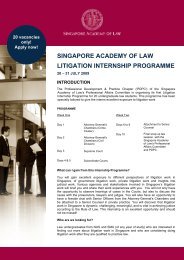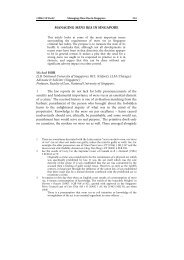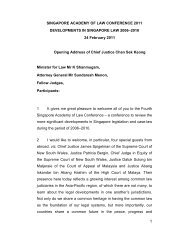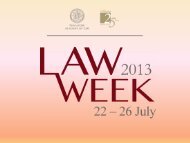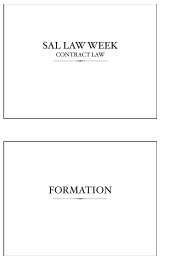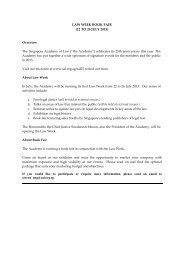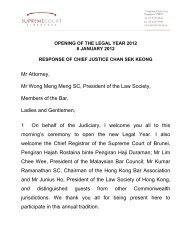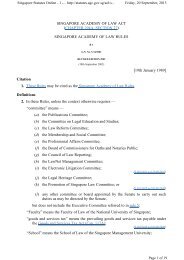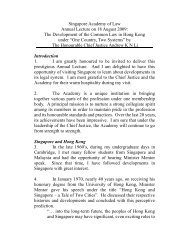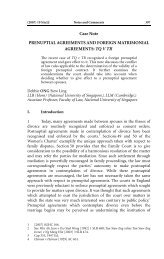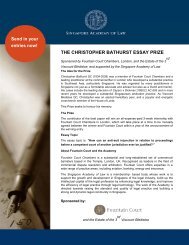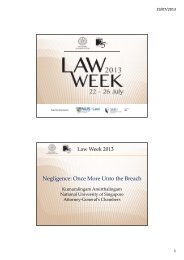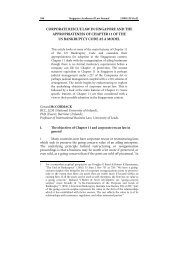View Article - Singapore Academy of Law
View Article - Singapore Academy of Law
View Article - Singapore Academy of Law
You also want an ePaper? Increase the reach of your titles
YUMPU automatically turns print PDFs into web optimized ePapers that Google loves.
15 SAcLJ Matrimonial Assets and the 3 rd Party 253<br />
(c) orders in favour <strong>of</strong> the 3 rd party, for example, ordering the<br />
husband and/or wife to pay the 3 rd party a sum <strong>of</strong> money, or to transfer<br />
an asset in their names to the 3 rd party.<br />
4.4.2 Orders made for or against a party<br />
82 Where a party has intervened in the matter, 64 or been joined as a<br />
party to the proceedings on the court’s own motion, 65 the court is entitled<br />
to make any orders it sees fit in relation to that party. 66 Such orders are<br />
obviously enforceable by any <strong>of</strong> the parties to the proceedings.<br />
4.4.3 Orders made against a non-party<br />
83 The case <strong>of</strong> Razman bin Hashim v South East Asia Insurance<br />
Co. 67 held that it would be a breach <strong>of</strong> the principle <strong>of</strong> natural justice for<br />
an order to be made against a non-party. In this case, the Malaysian High<br />
Court had held that the driver <strong>of</strong> a motorcar and the deceased rider <strong>of</strong> a<br />
motorcycle who had collided with each other had both been responsible<br />
for injuries to the appellant (the pillion rider on the motorcycle) and<br />
apportioned their liability on a 50:50 basis. The motorcar driver was a<br />
party to the suit, but the motorcycle rider was not, nor was he called as a<br />
witness, since he had died as a result <strong>of</strong> the collision. On appeal, the<br />
court held that the order apportioning liability should not have been<br />
made. It was made in breach <strong>of</strong> natural justice, as the non-party had not<br />
been heard in the matter. Also see the case <strong>of</strong> Soh Lai Chan and Another<br />
v Kuah Peng Hock and Another 68 where the High Court held that it<br />
would be inappropriate to make any order prejudicial to a person who<br />
was not a party to the proceedings. (The plaintiff in this case had urged<br />
the court to declare that the transfer <strong>of</strong> certain shares to the non-party by<br />
the first defendant should be declared void.) In the English case <strong>of</strong> Kalsi<br />
v Kalsi 69 the court held that the court could not issue injunctions against<br />
persons who were not parties before the court, except in very exceptional<br />
circumstances:<br />
“It is only in extremely limited circumstances that persons or<br />
entities who are not parties before the court can be affected by<br />
orders <strong>of</strong> the court. Even in the case <strong>of</strong> a Mareva injunction,<br />
64 As the husband’s aunt and mother did in Tebbutt, supra.<br />
65 See TSB Private Bank International SA v Chabra and another [1992] 2 All ER 245<br />
66 See the Holdings at paragraph (1), page 246 <strong>of</strong> TSB Private Bank International, supra.<br />
67 [1995] 2 MLJ 469<br />
68 [2003] SGHC 144<br />
69 [1992] 1 FLR 511



